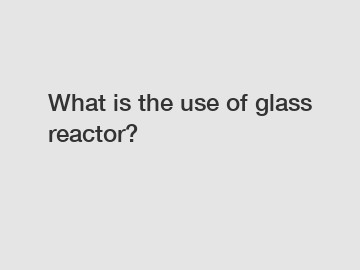What is the use of glass reactor?
What is the use of glass reactor?
Glass reactors are versatile laboratory instruments that play a crucial role in various scientific and industrial applications. These reactors are widely used in chemistry, pharmaceuticals, and biological laboratories for carrying out reactions at controlled temperatures and conditions. The primary purpose of a glass reactor is to provide a controlled environment for chemical reactions, offering scientists and researchers a safe and efficient space to explore and optimize their processes.
The use of glass reactors can be traced back to their exceptional chemical resistance and transparency. Glass, being an inert material, ensures that the reactants do not interact with the vessel walls, thus maintaining the purity of the reaction. Furthermore, the transparency of the glass allows researchers to monitor the progress of the reaction visually, enabling them to make necessary adjustments, if required.

The significance of glass reactors in the scientific community stems from their ability to handle a wide range of chemical reactions. These reactors can operate at different temperatures, from cryogenic to high temperatures, making them suitable for various types of reactions. The temperature control feature allows researchers to optimize reaction conditions and study the impact of temperature on the reaction kinetics and product formation.
The glass reactors also facilitate the study of reaction kinetics by providing excellent mixing capabilities. With the help of accessories such as stirrers, glass reactors ensure even distribution of reactants, resulting in efficient mixing and enhanced reaction rates. This feature is particularly beneficial for reactions that require precise control of mixing.
Glass reactors offer several advantages over other types of reactors, including their ability to handle corrosive and hazardous substances. Since glass is resistant to most chemicals, it can withstand the corrosive properties of reactive substances, ensuring the safety of researchers and preventing contamination of the reaction. This feature makes glass reactors an ideal choice for handling substances such as acids, bases, and corrosive gases.
Moreover, the versatility of glass reactors allows researchers to scale up their reactions from laboratory-scale to industrial-scale. The knowledge gained from small-scale reactions in glass reactors can be applied to larger reactors, facilitating the optimization and development of industrial processes. This scaling-up ability greatly influences the efficiency and cost-effectiveness of production processes in the chemical and pharmaceutical industries.
In conclusion, glass reactors serve as essential tools for researchers and scientists in various fields. Their use enables the safe and controlled exploration of chemical reactions, offering transparency, temperature control, and excellent mixing capabilities. The multi-functionality and versatility of glass reactors make them indispensable in laboratories and contribute significantly to the advancement of scientific knowledge and industrial processes.
If you are looking for more details, kindly visit Lab Freeze Dryers, electric muffle furnace, cheap freeze dryers.



Comments
0